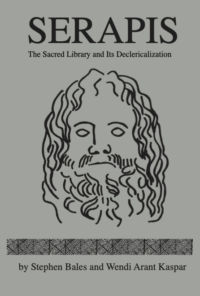Serapis
The Sacred Library and Its Declericalization
Authors: Stephen Bales and Wendi Arant Kaspar
Price: $45
Published: November 10, 2023
ISBN: 978-1-63400-097-0
216 pages
The Greco-Egyptian syncretistic god Serapis was used by the 3rd century BCE Ptolemaic pharaohs to impose Greek cultural hegemony and consolidate political power. The Alexandrian Serapeum, sometimes referred to as The Great Library of Alexandria’s “daughter library,” may be seen as an archetype for institutions where religion and secular knowledge come together for the reproduction of ideologies. The Serapeum, however, is by no means unique in this regard; libraries have always incorporated religious symbols and rituals into their material structures. Very little research has been conducted concerning the sociocultural and historical impact of this union of temple and information institution or how this dynamic interrelationship (even if it may now be implicit or partially concealed) stretches from the earliest Mesopotamian proto-libraries to our present academic ones.
Serapis complements and extends the work done in a previous monograph written by Bales: The Dialectic of Academic Librarianship: A Critical Approach as well as the book chapter “The Academic Library as Crypto-Temple: A Guide to Theory and Practice,” published in the Library Juice edited volume, Class and Librarianship: Essays at the Intersection of Information, Labor, and Capital. The book explores the role of the historical and legacy religious symbols and rituals of the academic library (referred to as the “Serapian Library”) as a powerful ideological state institution and investigates how these symbols and rituals support hegemonic structures in society. Specifically, the book examines the role of the modern secular “Serapian” academic library in its historical context as a “sacred space,” and applies the theories of Karl Marx, Louis Althusser, Ivan Illich, and other thinkers to explain the ramifications of the library as crypto-temple.
Stephen Bales is a Professor in Global Languages and Cultures at Texas A&M University. He has a master’s degree in Information Science and a PhD. in Communication and Information from the University of Tennessee—Knoxville. His research areas include the philosophy of librarianship, and ideology of the library. He sole-authored two monographs, The Dialectic of Academic Librarianship: A Critical Approach and Social Justice and Library Work: A Guide to Theory and Practice, and co-authored a third, Transformative Library and Information Work: Profiles in Social Work. He is General Editor of the Journal of Radical Librarianship.
Wendi Arant Kaspar is a Professor in International Affairs at Texas A&M University. She has a MLS from the University of Washington and a MS in Management from Texas A&M University – College Station. Her research interests include Human Resources and Management in Libraries, Innovation in Library Services, Outreach and Liaison. She has written numerous articles and book chapters and co-authored 3 monographs: Guide to Ethics in Acquisitions, Leading Libraries: Creating a Service Culture and Library Storage Facilities: from Planning to Construction to Operation. She has also been co-editor of 3 premier journals in librarianship, Library Administration and Management, Journal of Academic Librarianship and College & Research Libraries.
